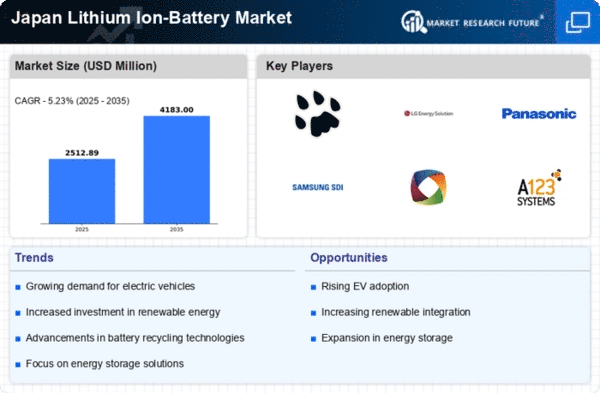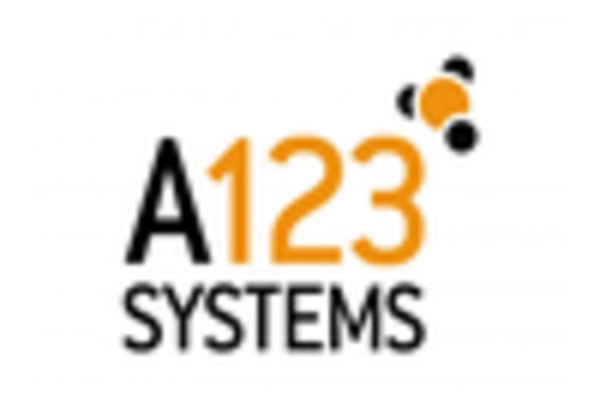Expansion of Consumer Electronics
The consumer electronics sector in Japan continues to expand, significantly impacting the lithium ion-battery market. With the proliferation of smartphones, laptops, and wearable devices, the demand for compact and efficient batteries is on the rise. In 2025, the consumer electronics segment is expected to contribute around 40% of the total demand for lithium ion batteries in Japan. This growth is driven by technological advancements that require higher energy densities and longer battery life. Consequently, manufacturers are investing in research and development to enhance battery performance, which is likely to further stimulate the lithium ion-battery market.
Government Support for Electric Mobility
Japan's government is actively promoting electric mobility, which is a crucial driver for the lithium ion-battery market. Initiatives such as subsidies for electric vehicle (EV) purchases and investments in charging infrastructure are encouraging consumers to transition to electric vehicles. By 2025, it is anticipated that EVs will constitute approximately 25% of new vehicle sales in Japan. This shift not only boosts the demand for lithium ion batteries but also fosters innovation in battery technology. The government's commitment to reducing greenhouse gas emissions aligns with the growth of the lithium ion-battery market, as these batteries are integral to the success of electric mobility.
Rising Adoption of Renewable Energy Sources
The increasing integration of renewable energy sources in Japan is driving the lithium ion-battery market. As the country aims to reduce its carbon footprint, the demand for energy storage solutions has surged. Lithium ion batteries are pivotal in storing energy generated from solar and wind sources, facilitating a more stable energy supply. In 2025, the renewable energy sector is projected to account for approximately 30% of Japan's total energy consumption, further propelling the need for efficient energy storage systems. This trend indicates a robust growth trajectory for the lithium ion-battery market, as these batteries are essential for balancing supply and demand in renewable energy applications.
Increased Focus on Recycling and Sustainability
The growing emphasis on recycling and sustainability is emerging as a vital driver for the lithium ion-battery market. As environmental concerns rise, Japan is implementing stricter regulations on battery disposal and encouraging recycling initiatives. By 2025, it is projected that the recycling rate for lithium ion batteries could reach 30%, significantly impacting the supply chain dynamics. This focus on sustainability not only addresses environmental issues but also reduces the reliance on raw materials, which can be volatile in price. Consequently, the lithium ion-battery market is likely to benefit from increased investments in recycling technologies and sustainable practices.
Technological Innovations in Battery Manufacturing
Technological innovations in battery manufacturing processes are significantly influencing the lithium ion-battery market. Advances such as improved electrode materials and enhanced manufacturing techniques are leading to higher efficiency and lower production costs. In 2025, it is estimated that these innovations could reduce the average cost of lithium ion batteries by up to 15%, making them more accessible for various applications. This trend is likely to attract new investments in the lithium ion-battery market, as manufacturers seek to capitalize on cost-effective solutions that meet the growing demand across multiple sectors, including automotive and energy storage.















